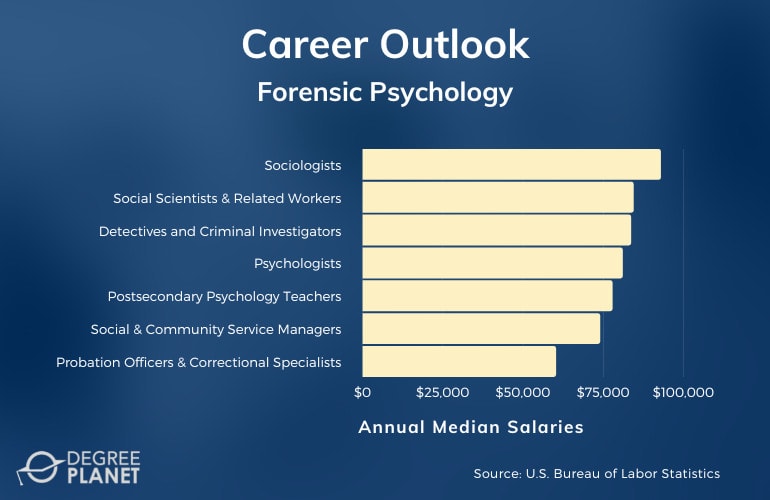If you’re intrigued by the human mind and want to make a difference in the world of criminal justice, then you may be interested in knowing how to become a forensic psychologist.

During your psychologist schooling, you can study abnormal psychology, family law, and crisis intervention. After completing your degrees, you may be qualified for forensic psychology jobs in corrections, community service, counseling, or courts.
Editorial Listing ShortCode:
You can explore the forensic psychology degree requirements to determine whether this career path is the right one for you.
How to Become a Forensic Psychologist

There are a number of steps to becoming a practicing forensic psychologist. It’s necessary to earn an advanced education, practice your skills, and demonstrate your competence.
Editorial Listing ShortCode:
Meeting the forensic psychologist requirements will take a while, but many find it to be a rewarding career path. Here’s a basic overview of how to be a licensed forensic psychologist:
- Earn a bachelor’s degree. Undergraduate studies—typically in psychology or a related field—is the first step toward a degree in forensic psychology.
- Earn one or more graduate degrees. Typically, you’ll get a master’s degree and then a PhD or a Doctor of Psychology (PsyD) in Forensic Psychology. Some doctoral programs don’t require a master’s degree first, but they may also take longer to complete.
- Take the licensing exam. To be a practicing forensic psychologist, you’re typically required to be approved by your state as a clinical psychologist. In most states, that requires passing the Examination for Professional Practice in Psychology (EPPP). It’s strategic to take this exam as soon after your doctoral program as possible.
- Use your skills. Before you can become a licensed psychologist, it’s necessary to gain work experience under an experienced professional. You’ll start the process during your doctoral program, but some states will have you do more afterward.
- Start working in the field. Once you’re fully licensed, you can practice independently. You might gain experience as a mental health counselor, a probation officer, or a law enforcement officer and gradually work your way toward more specialized roles.
- Pursue board certification. While it’s not required for most forensic psychology jobs, becoming board certified in this field can set you apart as a knowledgeable professional with specific forensic psychology training and skills.
- Maintain your credentials. You’re required to keep up with your continuing education and renewals so that you maintain your status as a licensed, board-certified forensic psychologist.
The requirements can vary from one state to another, so it’s beneficial to consult your state’s licensing board for specifics.
5 Things You Can Do as a Forensic Psychologist

Becoming an expert in forensic psychology could take your career in a variety of directions. Five potential options are listed below for your consideration.
1. Forensic Psychologist
A psychology expert who advises or consults on matters related to crime and court cases is often known as a forensic psychologist.
People with this job can have a variety of responsibilities. For example, they may testify as expert witnesses or run psychological assessments on defendants. Forensic psychologists work most often with criminal cases, but that’s not all they do. Others may work in civil or family courts.
2. Corrections Supervisor
An understanding of forensic psychology could be useful for a career in the corrections system. Potential positions for forensic psychologists could include correctional treatment specialist, probation officer, and correctional officer.
In general, a bachelor’s degree is the highest education required for entering those professions. Having an advanced degree in forensic psychology, though, might help you qualify for leadership roles. Corrections supervisors, for instance, oversee a department and supervise officers.
3. Victims’ Services Coordinator

Some community agencies specialize in providing services to people who have been crime victims, and experts in forensic psychology could be in a unique position to help those people.
Victim advocates serve as a resource for people in need of guidance and support. In addition to social service agencies, police departments and court systems may also employ victims’ service coordinators.
4. Investigative Journalist
Crime reporting often requires an understanding of the psychology involved in criminal behavior and victims’ responses. Forensic psychology professionals may be fitting for that job. Plus, graduate programs can be effective at honing people’s writing skills.
Investigative journalists may also uncover information in a case that can help the police. Some work for newspapers, and others may work for television programs, podcasts, websites, or other media outlets.
5. Forensic Psychology Researcher
Some forensic psychologists work as researchers instead of practitioners. They may study criminology or victimology.
Editorial Listing ShortCode:
Examining crime scenes, interviewing witnesses, and tracking data trends could be important aspects of the work of forensic psychologists. Their research may also influence community responses to crime. Researchers may also be teachers. They might teach college classes on psychology or a related subject. Sometimes, college professors have graduate students who help with their research projects.
Forensic Psychology Careers and Salaries

Forensic psychologists work in positions that may investigate crime, counsel patients, serve in the corrections system, or conduct research. According to the Bureau of Labor Statistics, jobs in the life, physical, and social sciences pay a median annual salary of $72,740.
| Careers | Annual Median Salaries |
| Sociologists | $92,910 |
| Social Scientists and Related Workers, All Other | $84,430 |
| Detectives and Criminal Investigators | $83,640 |
| Psychologists | $81,040 |
| Postsecondary Psychology Teachers | $77,860 |
| Social and Community Service Managers | $74,000 |
| Probation Officers and Correctional Treatment Specialists | $60,250 |
| Substance Abuse, Behavioral Disorder, and Mental Health Counselors | $48,520 |
| News Analysts, Reporters, and Journalists | $48,370 |
| Correctional Officers and Bailiffs | $47,920 |
Career paths for people with a background in forensic psychology are varied, and there might also be other job titles available to you that aren’t listed here.
How to Choose an Online Forensic Psychology Degree Program

Your forensic psychology degrees are an essential component of your career preparation. It’s strategic to make sure you choose the right schools for your studies.
You might want to take these factors into account as you compare psychology programs:
- Accreditation. To become a licensed psychologist, it’s often necessary to choose schools with regional accreditation. At the doctoral level, you could also pick a program with accreditation from the American Psychological Association (APA).
- Concentrations. If there’s a particular branch of forensic psychology that you want to study, you may want to look for schools with a relevant degree concentration. Examples include concentrations in mental health or the legal system.
- Cost. Tuition prices vary from school to school, but so do financial aid opportunities. You can see what various colleges offer you before making your final decision.
- Licensure. To become a licensed psychologist, it’s important to look for a college where the curriculum is designed for licensure preparation. You may need to make sure that it aligns with your state’s requirements.
- Online format. Not all online college programs are designed the same way. Some have you watch live classes at set times, and others have you engage with pre-recorded material. Schools may follow traditional or accelerated calendars. While psychology programs can be offered fully online, some schools require in-person attendance for some classes or practicums.
You may have other characteristics that are important to you as you search for schools. To help you decide, you could even talk to current or recent students and get in touch with an admissions counselor.
Accreditation

Throughout each step of your forensic psychology education, regional accreditation is essential. Without this mark of approval from an independent accrediting body, your studies may not hold much value.
Regional accreditation shows that a school is qualified to educate students. Transferring credits to other colleges depends on accreditation status, and so does getting into graduate programs. Hiring committees often take college accreditation into account. Registering for licensing exams may also require degrees from regionally accredited schools.
Editorial Listing ShortCode:
Whether you’re getting a bachelors, masters, or doctoral degree, it’s crucial to pick a college that’s approved by a reputable accrediting organization.
APA Accreditation for Forensic Psychology Programs
At the doctoral level, there’s another type of accreditation to consider: programmatic accreditation from the American Psychological Association (APA). The APA does not offer accreditation for bachelor’s or master’s programs.
As a doctoral student, you may want to choose an APA accredited program to simplify the process of taking the EPPP and getting licensed. Most licensing boards readily accept APA approved coursework because they know it meets high educational standards. In fact, there are some states that require APA accreditation for licensure.
If you’re interested in an APA accredited doctorate, you may have to look at hybrid programs rather than fully online ones.
Is Financial Aid Available?

Getting the appropriate degrees for a career in forensic psychology can take many years, so it’s often helpful to explore all financial aid opportunities.
You can start by filling out the Free Application for Federal Student Aid (FAFSA). Your eligibility for state and federal grant and loan programs depends on your financial status. Scholarships and fellowships may supplement your tuition assistance. These awards could come from your college, a membership organization, your workplace, or another group.
For your doctorate, you could look into fully funded PhD programs. Some doctoral candidates are able to go to school tuition-free, and they might even get a stipend.
Forensic Psychology Professional Organizations
Professional development requires surrounding yourself with industry leaders and always being open to learning and growing. Joining a professional organization for forensic psychologists might help you achieve those goals.
Groups to consider include:
- American Academy of Forensic Psychology (AAFP)
- American Board of Forensic Psychology (ABFP)
- American Board of Professional Psychology (ABPP)
Because these professional psychology organizations involve board certification, you’re typically required to apply for membership. Through a professional group, you may have access to workshops, grants, mentoring opportunities, and a variety of other benefits.
What Degree Do You Need to Be a Forensic Psychologist?

Typically, getting a job as a licensed forensic psychologist requires earning a doctoral degree in psychology. First, though, it’s necessary to complete a bachelors degree program and maybe a masters program as well. Though what you can do with a masters in forensic psychology may seem limited, for many professionals, it’s a prerequisite for earning a doctorate degree in the field.
After earning your PhD or professional psychology doctorate, you may be eligible to take the Examination for Professional Practice in Psychology (EPPP). Passing that step is a key prerequisite for becoming a licensed clinical psychologist. In addition, you may want to pursue board certification in forensic psychology. That’s a way to demonstrate that you’re an expert in this particular branch of psychology.
What Does a Forensic Psychologist Do?
A forensic psychologist is a licensed professional who applies psychological principles in legal or criminal justice system settings.
Forensic psychologists can have a variety of responsibilities. They may evaluate suspects, testify in court, provide services to victims, lead correctional facilities, or help solve cases. The tasks they do can depend on their job title and description. Potential jobs for forensic psychologists include correctional treatment director, victim advocacy program manager, expert witness, and behavioral disorder therapist.
Editorial Listing ShortCode:
Forensic psychology professionals can also be academics. They may conduct studies, write research reports, provide public policy recommendations, or teach college psychology classes.
What Are the Qualifications to Be a Forensic Psychologist?
Forensic psychology is a career that requires a lot of education. There are licensure requirements too.
Here are typical qualifications for this job:
- Bachelor’s degree. In a psychology bachelor’s program, you’ll study cognition, personality, and human development.
- Master’s degree. At this level, you may begin to focus your studies specifically on forensic psychology.
- Doctorate. As the top step in your education, you could pursue forensic psychology PhD programs or Doctor of Psychology (PsyD) programs.
- Licensure. Your state’s licensing board may require clinical psychologists to complete supervised practice hours and pass the EPPP.
You can check with your licensing board for more details on your state’s requirements.
How Much Do Forensic Psychologists Make?

According to the Bureau of Labor Statistics, most psychologists earn between $47,850 and $133,890 each year. The median annual salary for this profession is $81,040.
Many forensic psychologists fall into the Bureau of Labor Statistics’ “other psychologists” category. The median wage for that group is $102,900 per year. Other forensic psychologists may be considered clinical psychologists. The median salary for clinical, counseling, and school psychologists is $79,510.
Your pay may depend on your job title, your experience level, and your board certification. With a median annual salary of $103,850, psychologists who work for the government usually have the highest pay rates.
How Long Does It Take to Become a Forensic Psychologist?
It may take 8 to 10 years to complete the educational requirements for becoming a forensic psychologist. Full-time bachelor’s degree programs usually take 4 years, but there are some accelerated psychology degree online programs where students can finish in less time.
Editorial Listing ShortCode:
After that, you may need a master’s degree, which generally takes 1 to 2 years to finish. Finally, a PsyD or PhD will take several years. Program lengths vary, but they typically last 3 years to 5 years. There are also additional steps before licensure, such as completing supervised hours and taking the EPPP, but those qualifications vary by state.
What’s the Difference Between a Criminal Psychologist vs. Forensic Psychologist?
There’s overlap between the fields of criminal and forensic psychology, but they’re not exactly the same. Here are some of the differences between these two types of psychology.
| Forensic Psychology | Criminal Psychology |
|
|
Criminal psychology is sometimes considered a specific branch of forensic psychology.
Getting Your Degree in Forensic Psychology Online

You can unite your fascination with the human mind and your passion for the criminal justice system in a forensic psychology career. Whether you want to counsel offenders, support victims, testify in court, or conduct research, getting your forensic psychologist degree could help you work toward your ideal job.
Becoming a forensic psychologist requires multiple steps and years of schooling, but online college programs can help. By choosing online studies, you can better fit your college coursework around your schedule. If you choose accredited schools for your online psychology programs, you can count on getting a high-quality education that prepares you for the future.
You can start exploring accredited forensic psychology degrees today to begin your educational journey in this rewarding field.

